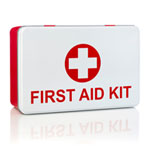8 Signs You May Not Be Getting Enough Magnesium

Magnesium deficiency can cause multiple symptoms and disorders, some which you may not even realize. Many people can even experience health problems due to lack of magnesium, but it is often blamed on other health issues.

Magnesium is a very important mineral that plays a vital role in the healthy function of your heart, kidneys, muscles, bones and the production of energy. It is also essential in regulating nutrients. You can actually suffer from a deficiency due to medication or alcohol consumption. The following are some of the signs you may experience if you are deficient in magnesium.
- You feel tired and lethargic. Magnesium deficiency can definitely be a problem if you are suffering from fatigue. Although you may be blaming your symptoms on your busy schedule, stress or other reasons, fatigue is a very common symptom for magnesium deficiency. In fact, magnesium will probably be the first thing your primary care physician checks if you visit your doctor with complaints of feeling tired and lethargic.
If you feel you are not getting enough magnesium in the foods you eat, you may want to consider magnesium supplements to help keep your energy levels up and relieve your fatigue. Talk to your doctor first and get their recommendation on whether or not a supplement is right for you. - You have muscle cramps and spasms. Vitamins D, E, B complex, potassium and magnesium play an important role in muscle health. If you suffer from magnesium deficiency, you may experience muscle spasms or painful muscle cramps in your shoulders and legs. Studies also show that restless leg syndrome may also be linked to low levels of magnesium.
- You experience heart issues. Magnesium is essential in maintaining normal heart rhythm and proper muscle contraction. Studies have shown that low levels of magnesium can contribute to an irregular heartbeat. Adding magnesium to your diet may actually lower the risk of heart disease and heart attack. Although there are several factors that can result in heart disease, many doctors find that there are positive results in prescribing magnesium for patients that are at risk for heart disease and heart arrhythmia.
- You feel dizzy. According to recent studies, fish oil rich in omega-3 fatty acids may slow the cognitive decline that comes with age. A study in the journal Archives of Low magnesium levels can also result in dizziness. If you experience a feeling of dizziness that does not go away, it could be due to magnesium deficiency. Dizziness is a difficult symptom to properly diagnose. Low magnesium is often overlooked as the culprit. In addition, as your magnesium levels continue to decrease, your dizziness symptoms could actually develop into vertigo, which can make it difficult to perform daily duties, such as going to work or just getting out of bed. If you are feeling dizzy, it is worth asking your physician to check your magnesium levels as a possible problem.
- You’re dealing with gastrointestinal problems. Nausea and vomiting can be the result of magnesium deficiency as well, but is usually an early sign of the problem. Symptoms of nausea and vomiting can also be caused by a variety of issues. Having low levels of magnesium is often missed. On the other hand, having too much magnesium in your body can also cause the same symptoms. Some medications can actually cause your magnesium levels to increase if you are also taking magnesium supplements.
- You have tingling and numbness. Numbness and tingling can be caused by a variety of problems, but one reason could be due to low magnesium levels since magnesium deficiency can have an effect on the nervous system. Numbness should never be taken lightly, as the problem could be due to a very serious issue. However, having low magnesium levels could be a contributing factor. If you are experiencing numbness and tingling, you should consult with your physician and ask if magnesium deficiency may be the cause.
- You go through mood swings. Believe it or not, magnesium levels can result in personality changes. Someone with low levels of magnesium may experience irritability, confusion and experience the feeling of being overwhelmed. Magnesium deficiency can even cause insomnia, which may significantly increase mood swings and personality changes.
- You suffer from panic attacks and anxiety. Life experiences can sometimes bring on panic attacks and anxiety; however, if you are regularly suffering from panic attacks or anxiety, it could be due to magnesium deficiency. Some of the symptoms may include difficulty breathing, chest pain, racing heartbeat and an overwhelming feeling of fear. Although you may feel that your panic attacks or anxiety are due to stress or a specific experience, it may be the result of an important mineral missing from your diet. Experiencing these symptoms can cause additional stress, which will increase your magnesium depletion. Talk to your doctor about checking your magnesium levels if you are experiencing any of these symptoms on a regular basis.
If you are looking for ways to supplement your diet with magnesium, the following are just some of the food sources that contain this important mineral: Dark chocolate, almonds, spinach, peas, sweetcorn, broccoli, cashews, peanuts, cereal soy milk, black beans, edamame, bananas, peanut butter, bread, walnuts, avocado, potato, rice, tofu and yogurt.
You might also be interested in...
-
 10 Signs You May Not Be Drinking Enough Water
10 Signs You May Not Be Drinking Enough Water
-
 8 Signs You May Not Be Getting Enough Magnesium
8 Signs You May Not Be Getting Enough Magnesium
-
 About Life Insurance
About Life Insurance
-
 Do You Really Need Life Insurance?
Do You Really Need Life Insurance?
-
 Does Divorce Spell The End Of A Happy Childhood
Does Divorce Spell The End Of A Happy Childhood
-
 Globe Life is Rated A (Excellent)
Globe Life is Rated A (Excellent)
-
 Health Symptoms You Should Never Ignore
Health Symptoms You Should Never Ignore
-
 History of Life Insurance
History of Life Insurance
-
 Home Cough Remedies
Home Cough Remedies
-
 How High Should Your SPF Be
How High Should Your SPF Be
-
 How To Be Responsible About Life Insurance
How To Be Responsible About Life Insurance
-
 Is Eating Organic Really Safer?
Is Eating Organic Really Safer?
-
 Is White Vinegar A Safe Cleaning Agent?
Is White Vinegar A Safe Cleaning Agent?
-
 Planning Your Family For An Emergency Evacuation
Planning Your Family For An Emergency Evacuation
-
 The Difference Between Power Of Attorney And A Living Will
The Difference Between Power Of Attorney And A Living Will
-
 Reconsider Getting a Life Insurance Policy
Reconsider Getting a Life Insurance Policy
-
 Setting Goals For Your Employees
Setting Goals For Your Employees
-
 Skills that Make Bosses Want to Hire You
Skills that Make Bosses Want to Hire You
-
 The Importance of Life Insurance
The Importance of Life Insurance
-
 The Importance of Term Life Insurance
The Importance of Term Life Insurance
-
 Is It Time To Review Your Life Insurance Policy?
Is It Time To Review Your Life Insurance Policy?
-
 Tips On How To Prevent E.coli
Tips On How To Prevent E.coli
-
 Too Busy to Stay Healthy?
Too Busy to Stay Healthy?
-
 What Is COPD And How You Can Prevent It?
What Is COPD And How You Can Prevent It?
-
 What is Term Life Insurance?
What is Term Life Insurance?
-
 When Insurance Becomes an Investment
When Insurance Becomes an Investment
-
 Choosing Whole Life Vs Term Life Insurance
Choosing Whole Life Vs Term Life Insurance
-
 Why You Should Look Into Term Life Insurance
Why You Should Look Into Term Life Insurance
-
 Making Your Home Senior-Friendly
Making Your Home Senior-Friendly
-
 Is Whooping Cough Making A Comeback
Is Whooping Cough Making A Comeback
-
 Unusual Tricks To Reduce The Risk Of Heart Disease
Unusual Tricks To Reduce The Risk Of Heart Disease
-
 The Best First Aid Kit Everyone Should Have
The Best First Aid Kit Everyone Should Have
-
 Beware Of Dangerous Mold
Beware Of Dangerous Mold
-
 5 Things You Should Know About Thyroid Health
5 Things You Should Know About Thyroid Health
-
 What Your Eyes Reveal About Your Health
What Your Eyes Reveal About Your Health
-
 Everyday Things That Can Cause Memory Loss
Everyday Things That Can Cause Memory Loss
-
 How To Discuss Life Insurance With Your Spouse
How To Discuss Life Insurance With Your Spouse
-
 Why That Cold Won’t Go Away
Why That Cold Won’t Go Away
-
 5 Ways To Keep A Healthy Smile
5 Ways To Keep A Healthy Smile
-
 How Dangerous Is Sugar?
How Dangerous Is Sugar?
-
 5 Warning Signs To Change Healthcare Providers
5 Warning Signs To Change Healthcare Providers
-
 Simple Secrets To Conquer Flu Season
Simple Secrets To Conquer Flu Season
-
 The Hidden Bad Side Of Everyday Foods
The Hidden Bad Side Of Everyday Foods
-
 How To Avoid The Scams That Tricked So Many
How To Avoid The Scams That Tricked So Many
-
 Six Foods That May Reduce Stroke Risk
Six Foods That May Reduce Stroke Risk
-
 Empty Nesters: Don’t Ditch Life Insurance Until You Consider This
Empty Nesters: Don’t Ditch Life Insurance Until You Consider This
-
 How Does Accidental Death Insurance Work?
How Does Accidental Death Insurance Work?
-
 4 Tips To Improve Your Credit Score
4 Tips To Improve Your Credit Score
-
 6 Tech Devices You Need For Family Safety
6 Tech Devices You Need For Family Safety
-
 Public Transportation Safety Tips
Public Transportation Safety Tips
-
 Is Globe Life Insurance Reliable?
Is Globe Life Insurance Reliable?
-
 Hazards in the Kitchen: What You Do Every Day that Puts You at Risk for a Serious Accident
Hazards in the Kitchen: What You Do Every Day that Puts You at Risk for a Serious Accident
-
 Surviving a Snake Bite
Surviving a Snake Bite
-
 Is Globe Life Insurance Term or Whole Life?
Is Globe Life Insurance Term or Whole Life?
-
 The Top 4 Leading Causes of Death for People Older Than 50 and How to Avoid Them
The Top 4 Leading Causes of Death for People Older Than 50 and How to Avoid Them
-
 Nine Eye-Opening Stats That Will Make You Rethink Texting and Driving
Nine Eye-Opening Stats That Will Make You Rethink Texting and Driving
-
 Risks of Dying from Cancer
Risks of Dying from Cancer
-
 What are the Odds of Dying While Taking a Selfie?
What are the Odds of Dying While Taking a Selfie?
-
 Can I Get an Accidental Death Quote Online?
Can I Get an Accidental Death Quote Online?
-
 Buying Life Insurance for the Whole Family
Buying Life Insurance for the Whole Family
-
 What You Need to Know Before Buying Term Life Insurance
What You Need to Know Before Buying Term Life Insurance
-
 Advantages and Disadvantages of Getting Life Insurance without a Medical Exam
Advantages and Disadvantages of Getting Life Insurance without a Medical Exam
-
 A New Year's Resolution You Can Keep: Buy Life Insurance
A New Year's Resolution You Can Keep: Buy Life Insurance
-
 Food Contamination: Ways to Avoid the Potential Dangers and Keep Food Safe
Food Contamination: Ways to Avoid the Potential Dangers and Keep Food Safe
-
 Can I Increase the Face Value of My Term Life Insurance?
Can I Increase the Face Value of My Term Life Insurance?
-
 What is Mortgage Protection Insurance?
What is Mortgage Protection Insurance?
-
 Do I need Accidental Death Insurance?
Do I need Accidental Death Insurance?
-
 How Does a Graded Death Benefit Whole Life Insurance Policy Work?
How Does a Graded Death Benefit Whole Life Insurance Policy Work?

 Insurance products are available in New York from
Insurance products are available in New York from  Insurance products are available in your state from
Insurance products are available in your state from 









































































